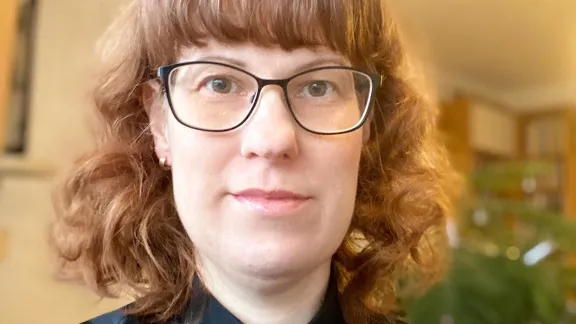
Rev. Lisa Buratti, pastor of the Church of Sweden parish of Lomma in the diocese of Lund. Photo: Lisa Buratti
Finding our place in God’s great creation
There is a saying that goes, “We are born as originals, but die as copies.” The quote is originally formulated as a question by the poet Edward Young in the 18th century: “Born Originals, how comes it to pass that we die Copies?” (“Conjectures on Original Composition,” 1759).
I think about it almost every time I baptize a child. We are indeed born originals into God’s great creation, unique pieces of a gigantic puzzle, where every piece is needed and cannot be replaced by another. Every child is a precious and unique person and has a unique calling by God to find his or her place in the world and in God’s plan.
This is not, however, the same as another concept so often verbalized in our time: that you can be anything you want if you try hard enough. To be able to distinguish between what we want on a superficial level and what we are truly called to be is not always an easy task, and it often takes both time and discernment. But I do believe that when we find and embrace our calling by God we will feel at peace, as if we have come home. It is, however, a journey that has to be undertaken day by day. Sometimes that journey is both a spiritual and physical one, as it was for Abraham and, indeed, also for the disciples of Jesus, who after his resurrection were called to carry the Gospel to the ends of the earth, travelling into unknown territories.
We have just begun a new year and, as always, the future is unknown territory for all of us. We can only walk in faith, taking the hand of God as it is offered to us, as it is written in a 1908 poem “God Knows,” by Minnie Louise Haskins: “Put your hand into the Hand of God. That shall be to you better than light and safer than a known way.”
To embrace the calling by God is, according to me, very directly and simply expressed in that image: to take God’s proffered hand. God is the one coming to us, as the Christmas message so clearly shows us, in the birth of Jesus, in his life and in his salvific activity. It is God who reaches out to his creation, to humankind, wanting us to listen and to follow him who is the Way.
Men and women who follow the Way
We do well to remember that before the followers of Jesus were called Christians, they were indeed called “men and women who follow the Way,” as written in Acts 9:2. In the Gospel of John, Jesus states that he himself is “the way, the truth and the life” (14:6). Later on, in the same speech, Jesus reminds his disciples that “you did not choose me, but I chose you and appointed you so that you might go and bear fruit — fruit that will last” (15:16).
If we live true and open to our personal calling, whatever that may imply in our lives, there will be lasting fruit, not always immediately visible to ourselves, which sometimes can be frustrating, but still there, present in the eyes of God. That is something we can rely upon and rest in, also in times of difficulty.
I also come to think of something Dag Hammarskjöld, second general secretary of the United Nations, wrote in a late entry in his journal, found only after his tragic death and published under the title “Waymarks”: “The Way chose you and you shall be thankful” (my translation).
Hammarskjöld, well versed in Christian thought and language and sometimes described as a spiritual seeker, seemed to have taken this to heart when carrying out what became his mission for the good of the nations and whose fruit is still visible today.
It is both a challenge and a comfort that we are born originals, each with our own irreplaceable place in God’s great creation. And, as we set out on our life’s journey, true to our calling, we may rest assured, be grateful and rejoice, since the one who gives the calling will also carry us each and every step onwards.
This blog first appeared as part of a series of Christian Unity week reflections for Rome’s Lay Centre, an ecumenical community of formation, hospitality and dialogue


